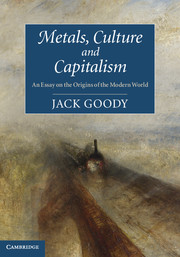Book contents
- Frontmatter
- Contents
- Maps
- Plates
- Preface
- Acknowledgements
- Chronology
- Part I Explorers
- Part II Merchants
- 7 ‘Capitalism’, exchange and the Near East
- 8 China and the Eurasian corridor
- 9 Renewal in the west
- 10 Venice and the north
- Part III Accumulators
- Appendix 1 The metallurgy of iron
- Appendix 2 Damascene steel and blades
- Glossary (with the aid of J. A. Charles)
- Bibliography
- Index
- Plate section
- References
10 - Venice and the north
Published online by Cambridge University Press: 05 June 2014
- Frontmatter
- Contents
- Maps
- Plates
- Preface
- Acknowledgements
- Chronology
- Part I Explorers
- Part II Merchants
- 7 ‘Capitalism’, exchange and the Near East
- 8 China and the Eurasian corridor
- 9 Renewal in the west
- 10 Venice and the north
- Part III Accumulators
- Appendix 1 The metallurgy of iron
- Appendix 2 Damascene steel and blades
- Glossary (with the aid of J. A. Charles)
- Bibliography
- Index
- Plate section
- References
Summary
Speakers of Semitic languages had early on traded from the Mediterranean coast, that is from Lebanon and Israel, and had marketed their wood (‘the cedars of Lebanon’), as well as their local manufactures in ceramics and in metalware. They searched for metals but they had later traded with Europe and the west, especially in the places to which the Phoenicians and Carthaginians had gone for raw metals, to Spain and to North Africa. In some cases the search for metals even led to colonial occupation, as was the case in the Roman Empire. This Empire also exploited its resources in gold that it needed to finance its trade with India as well as to keep its own soldiers and to pay off ‘barbarians’. But after the fall of the Roman Empire in western Europe the metal trade declined; silver which had replaced gold from the seventh century as the metal of account was won from lead and used in local mints. The sale of wool brought silver into Britain, and some precious metal was produced locally, although much was going out through the payments of Danegeld to the Norse invaders. After the Norman Conquest when the invaders were also of Scandinavian origin, English metal exports increased by a factor of ten, with lead being exported to France, and tin to Venice. Monasteries used a lot of lead for building purposes, which the Normans encouraged; it was also important in refining for silver. Mines were opened up; in Derbyshire, lead-workers were mining in 835. By the fourteenth century lead-mining occurred all over Europe employing a great number of people; in Edward IV’s time 10,000 were said to be engaged in the Mendip area alone. And in 922 the silver–copper mine was opened at Beirsdorf in Saxony.
- Type
- Chapter
- Information
- Metals, Culture and CapitalismAn Essay on the Origins of the Modern World, pp. 214 - 246Publisher: Cambridge University PressPrint publication year: 2012



